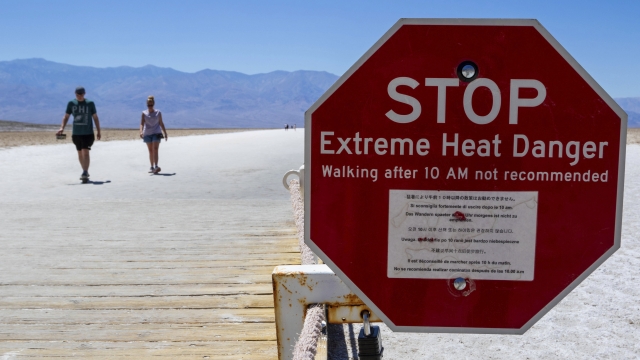A persistent and deadly heat wave is still baking parts of the country.
Almost a third of the country, stretching from the Mississippi River across the Southwest to the Pacific Ocean, is sweating under heat advisories, heat watches, and excessive heat warnings.
It's more than hot. It's oppressive.
The temperature index — a measure of what it feels like outside — has hit between 103 and 125 degrees. But that range is lower than the actual temperature in Death Valley, California. The hottest place on earth is expected to set or tie a record this weekend. The old, undisputed mark — set in 2021 — is 129.4 degrees Fahrenheit, but forecasters predict Death Valley will hit between 130 and 132 degrees on Sunday.
Everything's bigger in Texas, including the heat wave. The Lone Star State is sizzling once again this week under triple-digit air temperatures making it feel like it's almost 115 degrees, and possibly breaking another power usage record over the next few days.
SEE MORE: 100 million Americans under heat alerts
And in Phoenix, the city just can't cool down. It's been over 110 degrees every day this month, and it could shatter the record for most consecutive days of extreme heat next week.
While locals there are taking a plunge to cool down, officials are warning tourists that it's too hot to head out for a hike, because if it's anywhere from 110 to 115 degrees in the air, it's likely that it could be anywhere from 131 to 140 degrees on a trail. Just last week, a woman died hiking in the Grand Canyon.
According to Scientific American, more people die every year from the heat than from tornadoes and hurricanes combined.
And it's not just the land heating up; no, this is a surf and turf problem.
There's a marine heat wave in the waters off the Florida Keys. The temperature has jumped 10 degrees higher than normal, hitting 97 degrees.
Jim Abernethy, a local diver, tells Scripps News that "Massive numbers of animals are moving from where they used to be to a different climate so that they can be in the temperature that they like."
If the water stays this hot, it will likely kill the coral. The hot water on beaches and lakes around the state will also contribute to making it the hottest year on record in Florida.
Trending stories at Scrippsnews.com




